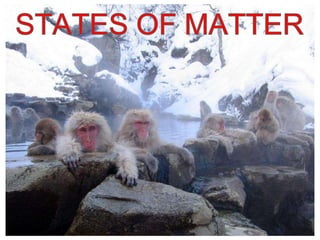Grade 5 States of Matter
- 2. DO NOW: Give an example of a Solid Liquid Gas What is a solid, liquid, gas? What is matter?
- 3. ● Matter is anything that takes up space and has mass. ● Matter doesn’t have to be visible—even air is matter. What is matter? 1 Everything in this photo is matter.
- 4. ● All matter is made up of tiny particles, such as atoms, molecules, or ions. ● Each particle attracts other particles. States of Matter 1 ● These particles also are constantly moving.
- 5. ●A material’s state of matter is determined by: ○Motion of particles ○attraction between particles
- 6. States of Matter ●States are defined by SHAPE and VOLUME
- 7. The Four (common) States ●There are four common states of matter ○Solid ○Liquid ○Gas ○Plasma
- 8. Solid ●SOLID: matter with DEFINITE shape AND volume ●Particles are packed tightly together ●DEFINITE: fixed, precise, does not change
- 9. ● The particles that make up all types of matter are in constant motion. ● Although you can't see them, a solid’s particles are vibrating in place. Particles in Motion 1 ● These particles do not have enough energy to move out of their fixed positions.
- 11. Aim: States of Matter DO NOW: Give an example of a Solid Liquid Gas What are the 4 states of matter? What 2 things define the state of matter?
- 12. Liquid ●LIQUID: matter with DEFINITE volume but NO DEFINITE shape
- 13. ● Liquids take the shape of their containers ● The volume of a liquid always stays the same
- 14. ● The particles in a liquid move more freely than the particles in a solid. Free to Move 1 ● The particles in a liquid have enough energy to move out of their fixed positions but not enough energy to move far apart.
- 15. ● Matter that exists in the gas state but is generally a liquid or solid at room temperature is called vapor. Vapor 1 ● Water, for example, is a liquid at room temperature. Thus, water vapor is the term for the gas state of water.
- 16. Gas ●GAS: matter with NO DEFINITE shape OR volume ●Gas particles are farther apart
- 17. Gas particles move at high speed in all directions
- 18. Plasma ●Plasma occurs at EXTREMELY high temperatures ●Found is stars, lightning, and neon lights ●Most common state of matter in the
- 19. State: Solid Liquid Gas Definite Shape? Yes No No Definite Volume? Yes Yes No
- 20. 1 Question 1 What state of matter is shown in this illustration? A. gas B. liquid C. plasma D. solid
- 21. 1 Section Check Answer The answer is A. Particles in a gas are much farther apart than those in a liquid or solid.
- 22. 1 Section Check Question 2 Some solids are composed of particles that fall into a pattern; they have a repeating, three- dimensional shape. What do you call these kinds of solids? Answer The answer is crystalline solids. A common example of a crystalline solid is table salt.
- 23. 1 Section Check Question 3 Which is composed of particles that have enough energy to move past each other but not enough to break away from each other? A. ice cube B. lemonade C. oxygen D. water vapor
- 24. 1 Section Check Answer The answer is B. Lemonade is a liquid. Particles in a liquid stay close together although they are free to move past each other.

